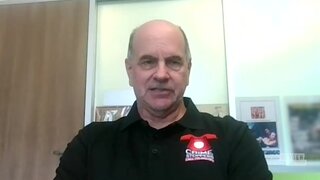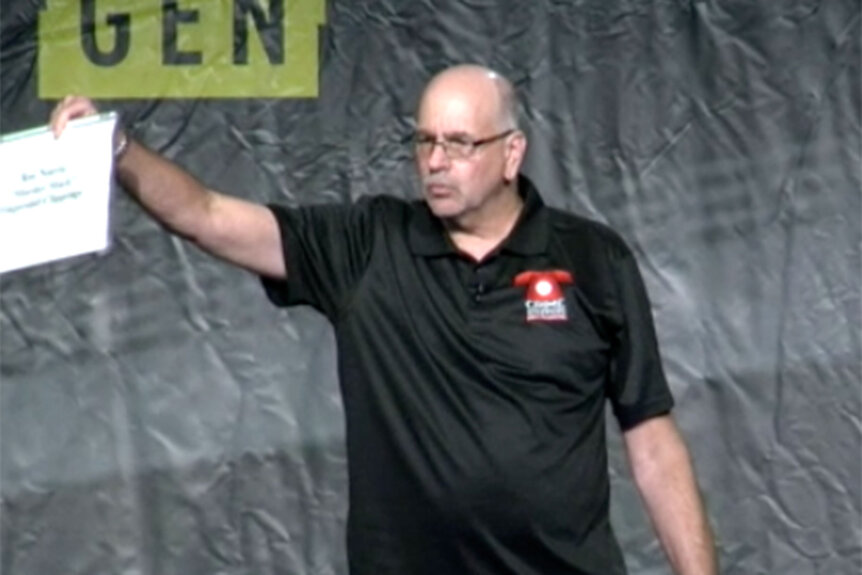Create a free profile to get unlimited access to exclusive videos, breaking news, sweepstakes, and more!
'A Very Strange Alliance:' Victim Advocate Works With 'Son Of Sam' To Get True Crime Collectibles Off The Market
Items coined as "murderabilia" range from artwork to fingernail clippings of serial murderers. Victim advocate Andy Kahan wants to stop criminals from profiting off their crimes.
Andy Kahan has locks of Charles Manson’s hair, a personal letter from serial killer Edmund Kemper, and prison-issued socks worn by "Toolbox Killer" Lawrence Bittaker. Kahan became an “avid buyer” of true crime collectibles in order to learn more about the market and figure out a way to stop an industry profiting off items tied to infamous crimes.
“I felt it was important for me to have the items in my possession so when I do talks or meet before elected officials and so forth, it’s a more powerful presentation,” Kahan told the audience at his 2021 Crime Con panel on the topic. The convention is presented by Oxygen.
Another item he described to the audience is a blow-up doll of serial killer Jeffrey Dahmer.
“The way they market the doll is it says 'Open me up for a sure delight and see who I ate for dinner tonight,' and you unzip the doll and body parts come out,” Kahan said.
Dahmer was convicted of 15 homicides and confessed to police he committed acts of cannbalism.
“I can tell you there’s nothing more nauseating and disgusting than to find out the person who murdered your loved ones has items being hawked by third parties for pure profit,” Kahan said. “It’s like being gutted all over again by our criminal justice system and I just wasn’t going to sit back and pretend this wasn’t happening. So, I decided to take it on.”
Kahan is the director of victim services and victim advocacy at Crime Stoppers in Houston, Texas. He’s worked as a victim advocate for nearly 30 years and before that worked as a parole and probation agent.
To explain the phenomenon, Kahan coined the term “murderabilia.” It refers to the market for true crime collectibles being sold and the types of items for sale.
Part of his motivation for initially buying items was learning how the industry worked.
“I wanted to know who the dealers were, how they operate,” Kahan said. “I would send them innocuous emails … and they would respond to me. I became so well known as a buyer I would get first dibs from the dealers before they put their items out on the public market.”
Items for sale could range from crime scene dirt to pieces of cloth from an old shirt of serial killer John Wayne Gacy, as well as old bills that may have a signature of a serial killer.
“I’m a firm believer in free enterprise and capitalism, but I’m also a believer that no one should be able to rob, rape, or murder and turn around and then make a buck off of it,” Kahan said.
Another misconception Kahan is battling is the illusion of "Son of Sam" laws preventing a marketplace for murderabilia from existing.
Convicted serial killer David Berkowitz, known as the "Son of Sam", shot and killed six people and wounded seven in the late 1970s in New York City. Following the shootings, New York crafted “Son of Son” laws to restrict killers from selling their rights for books, movies, or other items. In New York, any profits were supposed to go to victims or survivors. Forty other states adopted similar measures, according to Kahan.
“Most people still are under the belief that we have Son of Sam laws where you can’t profit from crimes in books and movies,” Kahan said. “Most people are absolutely shocked when they find out the Son of Sam laws were ruled unconstitutional.”
Simon & Schuster offered to buy the rights to Henry Hill’s story, Kahan explained to Crime con attendees. Hill’s life as a mobster turned FBI informant was the inspiration for the film “Goodfellas” and the book “Wiseguy.” In 1991, the case challenging the Son of Sam law eventually made its way to the Supreme Court where it was overturned because it was too broad of a restriction and was inconsistent with the First Amendment protections to free speech.
In the decision it states the court recognized “a compelling interest in compensating victims from the fruits of the crime, but little if any interest in limiting such compensation to the proceeds of the wrongdoer's speech about the crime.” Some states have rewritten these laws to make it easier for victims to sue over such profits.
When Kahan started the murderabilia project, he wrote to several serial killers. David Berkowitz was one of 12 who wrote back, according to a clip Kahan played at his Crime Con session.
“I actually ended up in a 20-year-relationship with one of the nation’s most notorious serial killers, none other than David Berkowitz,” Kahan said. “This is a very strange alliance.”
Kahan explained Berkowitz wanted to help stop people who committed crimes from making money off of items related to the crimes. While responding to a question from a CrimeCon attendee, Kahan said he found Berkowitz’s remorse to be genuine.
A reason Berkowitz’s assistance can be helpful to the project is he gets a lot of requests from dealers and people who would like to solicit new items from him, Kahan said.
“And you know what he does with all of those requests?” Kahan asked the crowd. “He sends them to me. So I get to see what everybody’s up to. It doesn’t get any better than having an inside source from whom all the profiting laws are named after.”
To combat the market and prevent murderers or opportunists from profiting off of horrific crimes, Kahan says he wants to get a federal bill passed, which unlike the original Son of Sam laws doesn’t focus on the speech or items created, but instead on the ability to profit off of them.
“My position is you can scratch, sniff, doodle, paint, whatever,” Kahan said. “You just don’t make money off of it and I started getting some of these laws passed.”






























